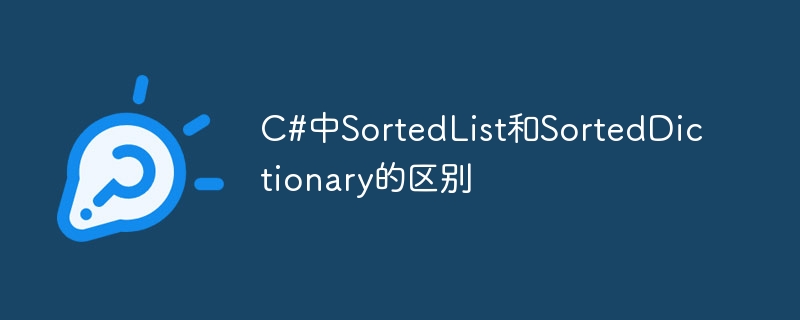Home >Backend Development >C#.Net Tutorial >The difference between SortedList and SortedDictionary in C#
The difference between SortedList and SortedDictionary in C#
- WBOYWBOYWBOYWBOYWBOYWBOYWBOYWBOYWBOYWBOYWBOYWBOYWBforward
- 2023-09-16 14:41:02929browse

SortedList and SortedDictionary in C# are both data structure types used for data storage. Now we can distinguish them based on characteristics and properties.
The following are the important differences between SortedList and SortedDictionary.
| Sr. Number | Key | SortedList | SortedDictionary |
|---|---|---|---|
| td>Memory Organization | SortedList requires lower memory to store, so the memory status in this case is overhead. | On the other hand, SortedDictionary requires more memory to store, so the memory state is not a bottleneck in its case. | |
| Design | SortedList is implemented internally as if the elements in sortedList are stored in consecutive blocks in memory. | In a SortedDictionary, on the other hand, the elements are stored in separate objects that can be spread across the entire heap. | |
| Fragmentation | SortedList requires lower memory to store, so memory fragmentation is higher. | On the other hand, since SortedDictionary is lower, it consumes more memory and has more fragments. | |
| Access | Elements in SortedList can be accessed using index. The user can pass the desired known index and get the value of the element stored at that index in the list. | On the other hand, users can access elements using indexes or keys. In this case, key access is sufficient and there is no need to use index to access the elements. | |
| Sort | In SortedList, as the name suggests, the elements are stored in sorted form. | However, SortedDictionary data, on the other hand, is stored in unsorted form. |
The above is the detailed content of The difference between SortedList and SortedDictionary in C#. For more information, please follow other related articles on the PHP Chinese website!
Statement:
This article is reproduced at:tutorialspoint.com. If there is any infringement, please contact admin@php.cn delete

